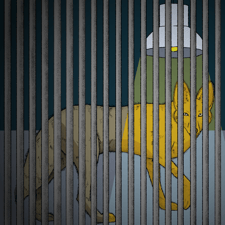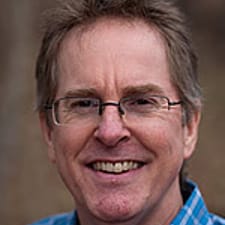And that’s why I went to jail.
What I did to protect the sanctity of research.
By Rik Scarce
Illustration by Janelle Delia (used with permission).
It’s odd. Why would Branzburg v. Hayes stick in my mind all those years? My initial encounter with that Supreme Court case, limiting the First Amendment rights of information gatherers to withhold material from law enforcement, came in a civil liberties course, a class in which I did so poorly that the professor invited me to retake an exam rather than fail me.
I guess I was moved (and disturbed) by the case’s story of a Kentucky reporter who witnessed a crime, wrote about it, and refused to betray his sources when state officials came knocking. What good is a “free press” if journalists aren’t free to write about whatever they choose? What is a free press if practitioners may be forced into de facto detectivehood?
Like an old familiar tune, Branzburg would come back to me every year or two when I’d be eating breakfast and come across another “Reporter Refuses to Testify” story in the newspaper. I’d read it and move on to my morning toast.
Then, abruptly, it was my turn.
On May 11, 1992, I was subpoenaed to testify before a federal grand jury about a break-in on the Washington State University campus, where I was a grad student in sociology. The Animal Liberation Front had taken responsibility, having freed some coyotes, stolen a couple dozen mink and mice, destroyed computers, and spray painted graffiti on laboratory walls. The damage came to around $100,000. Since federal government funding was involved, the FBI led the investigation, and federal (not state) law would apply.
The break-in had occurred the prior August while my family and I were on the east coast vacationing. I had been conducting research for my dissertation on the radical environmental movement. Our cat had needed sitting at our rented duplex in Pullman, and a guy named Rod Coronado had agreed to take care of her.
A famous radical environmental activist, Rod had teamed up with a Brit in the 1980s to sink half of the Icelandic whaling fleet, a story I retold in my book Eco-Warriors, published in 1990 as I began my Ph.D. studies. Intense yet friendly, good-humored, and deeply committed to radical environmentalism, Rod had some writing he wanted to do, so he welcomed the chance to just hang out for a couple of weeks.
I knew from prior legal advice I was on my own. No law would protect me if the authorities ever came for my research.
But by early 1992, the FBI had named Rod a “person of interest” in the WSU break-in. Because he had been housesitting for us at the time of the event, I figured the FBI might eventually come knocking. And I knew that, if they did, I would have nothing to say to them.
My Branzburg-like ordeal began on a beautiful May day. I was finishing up the semester’s grading and strolled into my campus office in the afternoon to find two phone messages from the same person. I called the number. It was the campus police. A sergeant asked me to come over to the station.
When I arrived, I was confronted by the campus cop and a tall, blond man in a suit: an FBI agent. My heart sank. We spoke for a half-hour or so, the conversation steadily shifting toward the break-in.
While I was writing Eco-Warriors, I had reached out to a First Amendment attorney to inquire what rights I had to protect confidential informants. In the course of my research, I was being told of crimes and wanted to assess the risk in publishing those stories. Surely something had developed since Branzburg — a new Supreme Court precedent or a federal “shield law” to protect reporters.
No, I was told. There was nothing other than that wretched decision, which didn’t shield but instead exposed First Amendment free-press practitioners to governmental intrusion.
I knew from that prior legal advice I was on my own. No law would protect me if the authorities ever came for my research. And I knew what I would do if the government came knocking. At least in the abstract I knew.
When the FBI agent handed me a subpoena to appear before a federal grand jury impaneled 90 miles north, in Spokane, theory met reality. My ideals stood naked before the immense power of the United States government. Two frantic weeks ensued.
The passive voice in that last sentence conveys the way I felt: there was no subject in my life. I felt a complete object. Writing about it thirty-three years later, my pulse and blood pressure still rise. I lost ten pounds and didn’t sleep. My dissertation chair, the only person I confided in, told me I needed a defense attorney.
“Why?” I asked. I had done nothing wrong.
“Because the government doesn’t know that,” came the reply.
I found an attorney, Jeffry Finer, the region’s foremost expert on grand jury practice. My wife and I handed over the pittance in our savings. To the emotional and physical toll was added an immense economic cost.
Jeffry began to guide me through what I might confront. Jail time was the worst possibility. The best: the federal prosecutor would soon realize, or be told by higher-ups, that the hassle of fighting an academic researcher and published author was not worth the time, effort, or bad publicity.
Jail was what frightened me. Being apart from my wife and stepson would be wrenching. And what would jail life be like for a skinny academic who couldn’t fight off a mosquito? But I also knew that, if it came to jail, jail it would be. The prosecutors would never make me violate the promises of confidentiality I made to my research participants.
In its twisted version of the facts, the government asserted that Coronado and I were friends and only friends, since he housesat for us — I was merely protecting a friend. But from my role of academic investigator, I was strongly motivated by principle. A free press is the rock upon which the entire edifice of our liberal society is constructed. It’s the only independent guarantor of government, corporate, and even personal responsibility.
Incidentally, at no point in my ordeal did the government object to my claim of a Free Press privilege against compelled testimony because I was “only” a graduate student; Supreme Court cases have affirmed a broad definition of “the press.” But, long since having sacrificed their ideals, the prosecutors seemed unable to grasp why I was standing for mine.
Weeks turned into months. My initial grand jury appearance kept getting pushed back. I ate better and slept a bit more. But still jail loomed. Jeffry did his best to negotiate with an intransigent prosecutor. I made things worse, far worse, by not letting my friends know of my subpoena and by not doing all I could to make resisting it a cause celebre. Instead, for seven months I tortured myself in the belief the hounds would catch scent of something more enticing.
Then the story that I had been subpoenaed broke. Damn free press! I finally testified to the grand jury over two days in March 1993. I responded to a few biographical questions and others about Rod Coronado. But over and over, three dozen times in all, I refused to answer the government’s probes about information I knew only through assurances of confidentiality I had made to research participants.
Each time I invoked the First Amendment’s protection, I crept closer to the jailhouse door. “The grand jury has the right to every man’s testimony,” the cant goes. But it won’t cotton their silence.
A robotic judge found me in civil contempt of court but allowed me my freedom until the Ninth U.S. Circuit Court of Appeals reviewed my case. In May, the appeals court casually upheld the district court judge’s opinion without issuing a written ruling.
Bizarrely, never having been charged, tried, or convicted, I would effectively be kidnapped, jailed indefinitely.
On May 14, 1993 — a year and three days after being subpoenaed — my wife, ten year-old stepson, and I got going early. We drove the long, boring road to the federal courthouse in Spokane. And there the judge ordered me held until….
Until when? Civil contempt carries no sentence, for the contemnor has not committed a crime, merely offended the court. Bizarrely, never having been charged, tried, or convicted, I would effectively be kidnapped, jailed indefinitely.
“In your lips,” the judge said as he shooed me away, “you hold the key to your release.” I called out for my stepson to watch as I was handcuffed and led away. I wanted Alex to see what the United States government does to those who fight for its Constitution.
After one night in a Spokane County holding cell, I was moved upstairs to the general population. My “cell” was actually a room with seven or eight beds. A guard pointed me to “2-House,” an electronic latch clicked, and I looked over to see my nightmare staring at me from the doorway: a 300-pound biker gang member.
As I warily approached, he said with admiration, “You dat dude we seen on TV last night, ain’t cha?”
To “Revvs” and the rest, I was the inexplicable: someone who could walk out of jail with one phone call to a judge yet chose not to. Instantly, I was the most respected person in the entire building. All thoughts of assault melted away. Endurance would become my enemy.
That word “held” that the judge used is a cynical one. It’s accompanied by the fiction, ensconced in federal law, that contemnors may not undergo punishment, only coercion, since they haven’t been convicted of a crime. Yet I lived my every moment among men being punished. I ate the same food, wore the same jail-issue underwear replete with other men’s shit stains, kept the same highly-regulated hours, and endured the same complete loss of freedom as they did. From the moment I was handcuffed, I was being punished.
On October 19, after 159 days of imprisonment as a non-prisoner, the judge threw in the towel and let me go. He held me one day longer than he’d kept another person swept up in the same grand jury case — one of Rod Coronado’s closest friends, who, unlike me, had no Constitutional claim to a shield against imprisonment. It seemed spiteful. Still does.
Paul Branzburg — the reporter-plaintiff in the 1972 Supreme Court Case — left Kentucky rather than risk being jailed by the state authorities. Under federal scrutiny, no such option was available to me. But neither of us ever told the government what it wanted to know.
